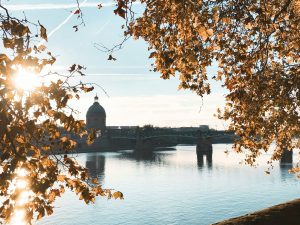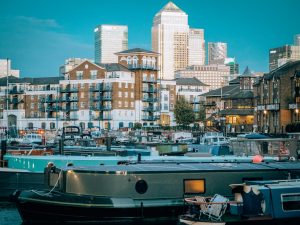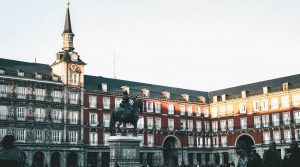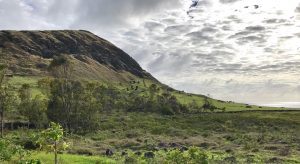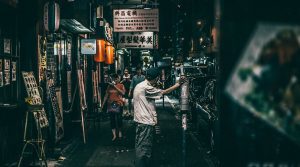Written From… London, the multicultural hub of England
Traversing borders on long, arduous journeys tends to leave agitated minds with nothing more to do than reflective self-encounter. Often, the restless come to face with haunting conflicts that cling and clamber to the forefront of waking life.
Irksome memories flicker tantalisingly until you seize on them, replay them and analyse them only to realise that, despite your best attempts to mindfully inhibit them, you can’t quite rid yourself of the uncanny feeling of self-struggle.
I’m no stranger to this kind of self-struggle. My young-adult life had been the culmination of seemingly endless positing of the cultural ambiguities that lay coiled at the heart of my web of significance. This very ambiguity was the cause of many internal bouts, upheavals of images of self-perception and the gnawing difficulty of cultural self-definition – in a word, struggle.
Confrontation with this ambiguity, though not always a purposive endeavour, was not at all hopeless. Solace came eventually over the course of a long and arduous overnight coach journey from London to Brussels.
The route to Brussels goes through the English coastal town of Dover – itself the historical grounds of many cultural upheaval thanks to its proximity to continental Europe – before embarking a ferry to the French town of Calais across the Channel and beyond to Belgium.
Upon reaching the port of Dover, a rather chilled process of passport and luggage inspection was undertaken as I passed through the customary border checks. An inspection officer curiously looked over my passport and an innocuous conversation began. My passport, clad with golden writing on the front states:
EUROPEAN UNION
GREAT BRITAIN
AND NORTHERN IRELAND
The less majestic inscriptions inside allude to perhaps the most arduous journey I have thus far travelled. It has as my place of birth, QUITO. The officer asked me, “where is Quito, then?”. I replied, “it’s the capital of Ecuador; city on the mountains”. He proceeds to ask me about my country of birth and I gladly reply to his friendly queries.
Back on the bus the reintegrating small talk with my travel buddy commenced before the restlessness once again sat in. As it turned out, my travel buddy had the same conversation with a different passport inspector – he too was born in Ecuador.
Although we hold British citizenship, we talk as the British do – nuanced by south-east London accents – and presented British passports, our interactions were based on and centred around the wonderfully inescapable fact that we are Latin-American. It’s on our skin, it shows in our features, our culture is subtly expressed in our every mannerism.
The innocuous conversation, now etched into memory, at the time gripped tightly onto every thought. The memory was too uncanny to shake, it brought with it so many other memories belonging to me as an almost-second-generation immigrant, born in Ecuador, raised in London. Here we arrive at the source of the conflict that plagued a particularly large crevice in the canyon of my mind, one which I, in my restlessness, came to face.
The conflict was one of cultural ambiguity, identity, upbringing and community. Perhaps the conflict was adequately represented by the item that sparked the conversation, my passport. As a Latin-American almost-second-generation immigrant, I defined myself by a tension of two nationalities, two vastly different cultures, two histories, two identities, two languages, two communities, two experiences.
Memories clutched on and flashed before my eyes, memories of helping my parents work in the cleaning industry out of necessity, of acting as translator, of loneliness and independence as my parents worked tirelessly to provide for us – my older sister and me. All the while, we understood ourselves to be in a privileged position, in the security of the First World, the state’s schooling system and comparative economic stability.
There were memories of unbelievable love in the connectivity of a tight-knit community formed under the circumstances; of happiness, acceptance and pride in the vibrance of our customs and traditions. Though, memories of incomprehension went hand in hand with the former.
Not understanding why, for example, I was not allowed the same freedoms and independence as my peers outside of our tight-knit community, which, in turn, engendered feelings of oddity. I felt an outsider in my home – London. There were memories of not understanding the reasons for overprotective parenting and the fear of unknown youth culture that informed parental decisions.
Above all, there were memories of returning ‘home’ – Ecuador; of a love unlike any other; of being sewn so tight to one’s roots that it penetrates one’s very being. Yet, again, I felt like an oddity, an outsider, a westerner, precisely when returning ‘home’.
Towards the end of the one-and-a-half hour ferry journey, upon entering the port of Calais, it dawned on me that, broadly, the two facets of this particular ambiguity were placed at odds through attempts to culturally define myself rigidly one way, or the other – Londoner or Ecuadorian.
I am in the minute intercrossing segment of an incredibly small venn diagram consisting of: British citizen, Londoner and Latin-American. My experiences are informed by the spectres of History and Religion, of the precocious continent that specialised in losing on the world stage, of conservative catholicism, empire and oppression.
All of which condition one side of the cultural ambiguity. At the same time, my experiences are also informed by the liberal platform of western society, the grandeur of progression and quixotic dreaming allowed only by the privilege of opportunity. All of which condition the other side of the cultural ambiguity.
It is precisely my position in this venn diagram that allows for a unique perspective, a bridging perspective between western world and Latin-America. To attempt rigid self-definition was to burn the bridge all together.
My cultural self-struggle became my cultural project. First was the desire to travel long-term. In that way, I would expand the boundaries of my perspective and, in turn, this brought with it a collaborative project to create a space that makes travel accessible for the bridging of cultures.
The Written From Travel project allows for the exchange of ideas, practices, experiences and traditions – culture in the broadest sense – and to provide a platform for bridging perspectives, allowing opportunities for growth in the fluid synthesis of ideas, practices and traditions.
Our cultural ambiguities are not tragedies that irreconcilably fragment us. Rather, by them we are vested with unique perspectives. They inform us and create platforms for cultural bridges and cultural synthesis. As for long and arduous journeys… Plenty are still to come and I look forward to gripping self-encounters that broaden the horizon of my being.
Feature image: Free-Photos – Pixabay

